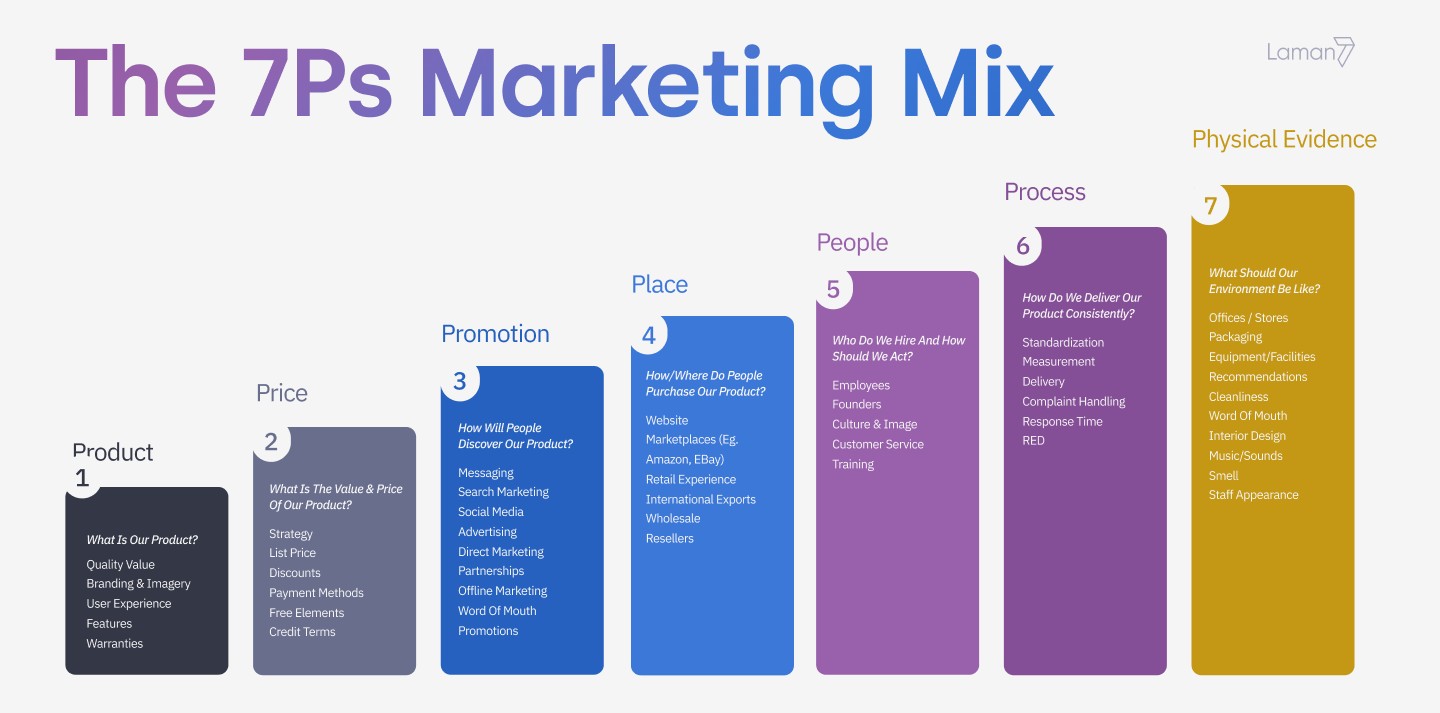Success in dynamic marketing hinges on effectively deploying strategic tools and frameworks. One such influential model is the 7P Marketing Mix, popularized by marketing guru Philip Kotler.
This comprehensive approach goes beyond the traditional 4Ps, offering a more nuanced and contemporary view of marketing strategy.

Original 4P Marketing Mix
1. Product (Original 4P)
At the core of any marketing strategy is the product itself. Kotler’s 7Ps emphasize the features and benefits and the overall customer experience. Understanding the target audience’s needs and preferences is crucial to developing a product that stands out in the market.
What is Our Product?
- Quality Value
- Branding & Imagery
- User experience
- Features
- Warranties
2. Price (Original 4P)
Determining the right price requires a deep understanding of market dynamics, competition, and consumer behaviour. Kotler stresses the need for a pricing strategy that aligns with the perceived value of the product or service, creating a fair exchange for both the customer and the business.
What is the value & price of our product?
- Strategy
- List price
- Discounts
- Payment methods
- Free elements
- Credit terms
4. Promotion (Original 4P)
Promotion encompasses all the communication strategies used to create awareness and persuade potential customers. Kotler emphasizes the importance of a cohesive and integrated promotional mix that includes advertising, public relations, personal selling, and digital marketing.
How will people discover our product?
- Messaging
- Search Marketing
- Social Media
- Advertising
- Direct Marketing
- Partnerships
- Offline marketing
- Word of mouth
- Promotions
4. Place (Original 4P)
In the context of the 7Ps, ‘place’ refers to the distribution channels and methods used to deliver the product to the consumer. Kotler encourages businesses to assess the most effective and efficient ways to make their products accessible, considering physical and digital channels.
In the service business, ‘place’ takes action in various locations such as online, in-house, onsite, and remote.
How/where do people purchase our product?
- Website
- Marketplaces (eg. Amazon, eBay)
- Retail experience
- International exports
- Wholesale
- Resellers
Addition: 7P Marketing Mix for Services
5. People (Additional Ps)
Recognizing the significance of customer interactions, Kotler introduces the “People” element. This extends beyond the employees to encompass customer service, relationship management, and the overall customer experience. Positive interactions contribute to brand loyalty and advocacy.
- 4Ps: The original marketing mix did not explicitly focus on people. While customer considerations were implicitly part of the marketing strategy, the 4Ps did not address the importance of personnel and customer interactions.
- 7Ps: Kotler introduced “People” as a crucial element, emphasizing the significance of customer service, employee interactions, and the overall customer experience. This addition acknowledges the human component of delivering and receiving the product or service.
Understanding your market with Atomic Marketing Strategy
Who do we hire and how should we act?
- Employees
- Founders
- Culture & image
- Customer service
- Training
6. Process (Additional Ps)
The “Process” element involves the systems and procedures that guide the delivery of products or services. Kotler encourages businesses to streamline processes to enhance efficiency, reduce costs, and improve overall customer satisfaction.
- 4Ps: The process was not explicitly addressed in the traditional marketing mix. While distribution channels (Place) were considered, the broader procedural aspects of delivering a product or service were not a specific focus.
- 7Ps: Kotler introduced “Process” to highlight the systems, procedures, and processes that guide the delivery of products or services. This includes everything from order processing to after-sales service, emphasising streamlining operations to enhance efficiency and customer satisfaction.
See our approach on Marketing as a Service.
How do we deliver our product consistently?
- Standardization
- Measurement
- Delivery
- Complaint handling
- Response time
- R&D
7. Physical Evidence (Additional Ps)
In a service-oriented economy, tangible evidence of a service becomes a critical factor. Kotler introduces “Physical Evidence” as the element that provides proof of the service, reassuring customers of the value they are receiving.
- 4Ps: The original model did not explicitly account for the tangible elements that serve as evidence of service, especially relevant in service-oriented industries.
- 7Ps: “Physical Evidence” is introduced as an element that provides tangible proof of the service. This includes the physical environment in which the service is delivered and any tangible cues that reassure customers of the value they are receiving.
For example, the work that we’ve done for our clients.
What should our environment be like?
- Offices/stores
- Packaging
- Equipment/facilities
- Recommendations
- Cleanliness
- Word of mouth Interior design
- Music/sounds
- Smell
- Staff appearance
Applying the 7Ps: A Holistic Approach
Kotler’s 7Ps are not isolated components; they work synergistically to create a holistic marketing strategy. Businesses embracing this approach are better equipped to navigate the complexities of the modern market, where customer expectations are high and fierce competition.
Conclusion – 7P Marketing Mix for Services
In marketing, the 7Ps based on Kotler’s insights provide a robust framework for businesses seeking sustained success. By paying attention to every facet of the marketing mix, from the product to the entire customer experience, organizations can create a comprehensive strategy that resonates with their target audience and sets them apart in a crowded marketplace.
As we delve deeper into the intricacies of marketing, the 7Ps remain an invaluable guide for those aiming to thrive in an ever-evolving business landscape.
Another framework to look at is the AAARRR Funnel for Marketing, which helps deliver the right messages at the right time.
Next Step
We help Manufacturers and Distributors get more leads. Learn how Marketing as a Service can benefit your company and sales team.





